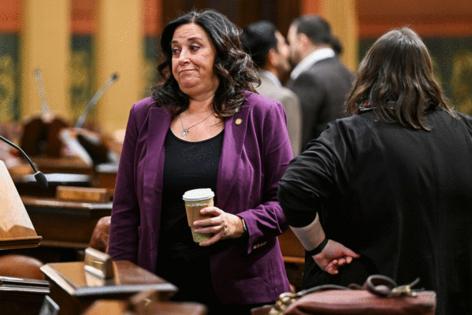Michigan House ends session, won't return until Dec. 31 after days of boycotts
Published in News & Features
LANSING, Mich. — The Michigan House adjourned Thursday until the end of the year following a days-long boycott of session by Republicans and one Democrat that ended with an hour-long — and fruitless — effort to round up missing members to establish a quorum needed to pass legislation.
Just after 2 p.m., House Speaker Joe Tate closed the attendance board, confirmed the House lacked a quorum and adjourned until 1:30 p.m. Dec. 31. An hour earlier, Tate had issued a rare "call of the House," a mandate requiring the House sergeants to bar the doors to the chamber and retrieve any absent members.
All 54 House Republicans and Democratic Rep. Karen Whitsett of Detroit had been boycotting the year-end lame duck session in recent days, causing the Legislature's work to grind to a halt because the House lacked a minimum 56-vote quorum to pass bills.
Tate, D-Detroit, left the House immediately after the adjournment and refused to answer questions from reporters.
The adjournment in the lower chamber means dozens of bills that have not gotten approval from a second chamber are effectively dead for this two-year term.
Tate's "call of the House" order came moments after Whitsett confirmed to a Detroit News reporter that she was in Lansing but would not come to the House until lawmakers dealt with "Black issues," an apparent reference to urban and criminal justice policies for which Whitsett has advocated.
A House sergeant entered House Minority Leader Matt Hall’s office, but left shortly afterward without the Richland Township Republican. The door to the office later was locked.
Speaker Pro Tem Laurie Pohutsky, D-Livonia, told reporters the "call of the House" order was meant to pull in as many of the 55 missing members as possible, including all 54 Republicans. Michigan State Police troopers were not deputized to help with the search for missing lawmakers during the brief search.
"The aim is to get a quorum and try to get as much work as we possibly can done,” Pohutsky said.
Rep. Tyrone Carter, a Detroit Democrat and ally of Tate, said the need for such action was "disheartening," and blame lay with all members — including the GOP — who were missing from session.
"People made promises, they took an oath, to say that I am going to be where I'm supposed to be; you're supposed to be here today," Carter said. "How can you be a lawmaker and not a law abider?"
House Republican staff was kicked off the floor shortly after the call was issued. When asked why House GOP aides were kicked off the floor, Pohutsky said their presence on the floor was at the pleasure of the majority party leadership.
"If their bosses aren't going to show up and do their job then there's no point for staff to be here," she said.
Democrats currently hold 56 of the 110 seats in the House, meaning they need every single one of their members present to be able to pass bills. All 54 House Republicans have been boycotting session since Friday over demands for changes to paid sick leave and tipped wage laws that go into effect in February.
In January, Republicans are taking control of the House, with a 57-53 majority, after picking up three seats in the November election.
"Being a leader means showing up for work & showing up for the people you serve," Tate said on social media.
On Wednesday, Whitsett and Sen. Sylvia Santana, another Democrat from Detroit, declined to show up for session, leaving Democrats in both the House and Senate without enough votes to pass a slew of bills.
The pending proposals in Lansing include ones that would boost the percentage of workers' health care paid for by public employers, that would extend the statute of limitations for victims of sexual abuse and that would bring an historic expansion of the state's open records law.
Santana arrived in the Michigan Senate as session began Thursday morning, meaning Democrats would again have the 20 members present to approve bills. Santana said she had become frustrated that some bills that mattered to her community hadn't been acted on earlier in the two-year term.
But Santana said Democrats still needed to get the measures to Gov. Gretchen Whitmer by end of 2024. In January, Republicans will take control of the state House after winning a majority in the November election.
"I am hoping that we have 56 votes in the House," Santana said. "Otherwise the Black agenda dies with Karen Whitsett."
On Tuesday and Wednesday, the Detroit lawmaker said she wouldn’t attend session until leadership could guarantee passage of policy that would retain the tipped credit, alter paid sick leave laws, implement a water affordability program and create a public safety trust fund.
"I’m staying home for my constituents," Whitsett said Tuesday night. "We’re not going to be voting on garbage bills that do nothing for our community and have a negative impact.”
Legislation creating the framework for a public safety trust fund is up for a vote in the Senate, but funding for the program was signed into law in the annual budget passed in June. The water affordability bills are awaiting a vote in the House, but it’s not clear whether there are enough votes among Democrats to pass the legislation.
On Thursday, House Republicans were planning to hold a series of press conferences outside of Lansing. The events would focus on Democrats' "continued refusal to address pressing issues, including the pending elimination of the tipped wage," statements from the House GOP said.
Santana didn't specify which bills she was focused on Thursday — what's expected to be final session day for the House of the year. The Senate has additional session days scheduled for Friday and Monday, but it wasn't clear if votes would occur those days. Legislative leaders have the power to add additional session days to the schedule, up until New Year's Eve.
Santana has been pushing a series of criminal justice reforms in Lansing in recent weeks. And some Democrats have been closely watching the four-bill package that would create the low-income water residential affordability program, initially funded by a $2 per month surcharge on water meters.
The Senate session began at 10 a.m. Thursday. The House's session was scheduled to start at noon.
Rep. Rachel Hood, D-Grand Rapids, said she remained hopeful about Thursday.
"There's so much that we've left on the table,," Hood said.
Whatever plays out in the Legislature in the coming days will help shape the legacy of the 2023-2024 term, the first in about four decades that Democrats have held majorities in both the House and Senate.
Whitmer, also a Democrat, has said little publicly about what she wants lawmakers to pass before the session ends.
Where's Whitmer?
While members of her own party struggled to try to salvage the 2023-24 session, Whitmer posted a video on social media Wednesday about her priorities for 2025, her second to final year as governor.
Bruce Timmons, a former longtime legislative staffer, questioned Thursday morning where Whitmer was during the lame duck session.
If the Legislature leaves town with nothing accomplished in the final days of the term, it will happen on Whitmer's watch, Timmons said.
"This will be a black eye on her legacy — that she could not get House, Senate and the respective leaders of each, to plan for lame duck and accomplish common objectives before Republicans control the House next year," Timmons added. "She has a lot to lose with this end-of-session chaos."
Water affordability bills
The water affordability legislation Whitsett is demanding has been on the House agenda for days but has not yet been put up for a vote. It isn't clear whether House Democrats have enough votes to pass the legislation.
State Rep. Peter Herzberg, D-Westland, told The Detroit News Thursday he was "undecided" on the legislation. When asked whether he shared that information with Whitsett, he declined comment.
The water affordability program currently awaiting votes would implement a $2 to $3 monthly surcharge on users that would be collected by the Michigan Department of Treasury.
The money collected by the state agency would be used to eliminate money owed for water bills, to ensure billing is based on household income and to keep an individual from spending more than 3% of household income on water.
An individual eligible for the program could not have a household income more than 200% of the federal poverty levels. Others considered eligible include those who have received state or federal emergency relief, food, medical or energy assistance in the past year.
If an individual's application for the affordability program is accepted, a provider "would have to provide a discount, credit, or other method on the eligible customer’s water bill to result in a bill that is affordable based on the eligible customer’s household income, as determined by the program administrator," according to an analysis by the nonpartisan House Fiscal Agency.
The bill also requires the program administrator to make “a good faith effort” to determine whether a household needs a plumbing repair and connect the customer with up to $2,500 per household to fix the water service.
Pohutsky said she shared Whitsett's policy goals, noting the water affordability legislation in particular had been a work in progress for years.
©2024 www.detroitnews.com. Visit at detroitnews.com. Distributed by Tribune Content Agency, LLC.












Comments